Fast Growing Privacy Trees
- January 2, 2025
- 0 comment
Have you ever felt the need for more privacy in your yard but don’t want to install a fence? Or perhaps you’re looking for a way to block noise, reduce wind, or create a natural screen that enhances the aesthetics of your property?
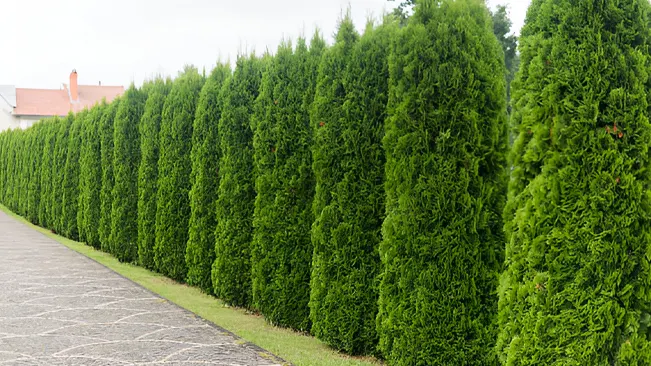
If so, you might be wondering, “What’s the fastest way to achieve a private, serene outdoor space?” The answer: fast growing privacy trees.
What Are Fast Growing Privacy Trees?
Fast growing privacy trees are species of trees that quickly reach a significant height and width, creating a natural barrier between you and neighboring properties, roads, or other unwanted views. Unlike traditional fencing, privacy trees are a living solution, providing not only seclusion but also improving air quality, offering shade, and boosting the visual appeal of your landscape.
By planting these trees, you can enjoy a lush, green screen in just a few years rather than waiting decades for slow-growing species to mature. Let’s dive into what makes these trees special and explore the best options for different environments.
Factors Affecting the Growth of Privacy Trees
Before choosing a type of tree for your privacy needs, it’s essential to understand the factors that influence the growth rate and success of these plants. Several elements impact how quickly privacy trees grow, and addressing these will help ensure that your investment thrives.
- Climate and Location: Trees grow best in climates suited to their native habitat. A tree that flourishes in the cool, wet conditions of the Pacific Northwest may struggle in the dry, hot climate of the Southwest. Always choose species adapted to your local climate to promote rapid growth and long-term health.
- Soil Type: Different trees have varying preferences when it comes to soil. Some species thrive in rich, well-drained soil, while others tolerate sandy or clay-heavy environments. Testing your soil’s pH and structure can help determine the best tree species for your property.
- Sunlight Exposure: Most fast growing privacy trees require full sun for optimal growth. If your planting area is shaded, you’ll need to choose varieties that can handle less light.
- Water Availability: Even the fastest growing trees need adequate water, especially during their first few years. However, too much or too little water can stunt growth or cause diseases. If your region experiences droughts, consider drought-resistant trees or install an irrigation system.
- Spacing and Maintenance: Planting trees too closely together can lead to overcrowding, which inhibits their ability to grow fully. Proper spacing, regular trimming, and maintaining healthy soil will ensure your privacy trees grow as quickly as possible.
Types of Fast Growing Privacy Trees
Not all trees grow at the same rate or offer the same type of privacy. Below are several popular options, each with its unique benefits.
1. Leyland Cypress
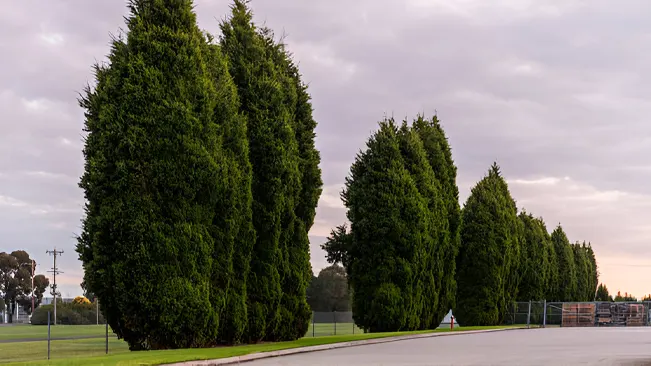
Known for its rapid growth rate, Leyland cypress is a favorite for those seeking a dense, evergreen screen. This tree can grow up to 3-4 feet per year under ideal conditions and reaches a height of 40-60 feet. Its conical shape and lush green foliage make it perfect for blocking views and noise.
2. Thuja Green Giant
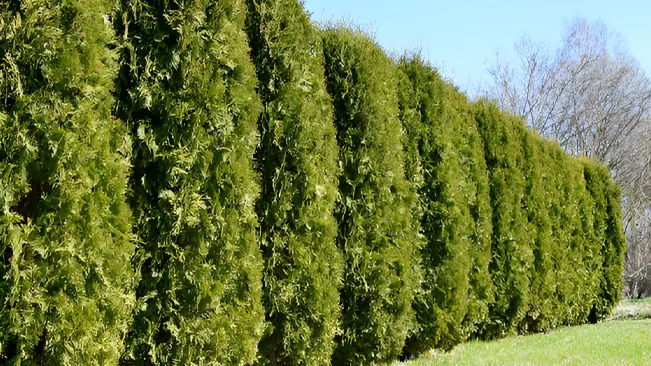
Another popular choice, the Thuja Green Giant, is an evergreen that can grow up to 3 feet annually. Hardy and resistant to most pests, it thrives in a range of soil types and climates. It’s ideal for large properties and can reach 30-40 feet in height, forming a thick barrier.
3. Bamboo (Clumping Varieties)
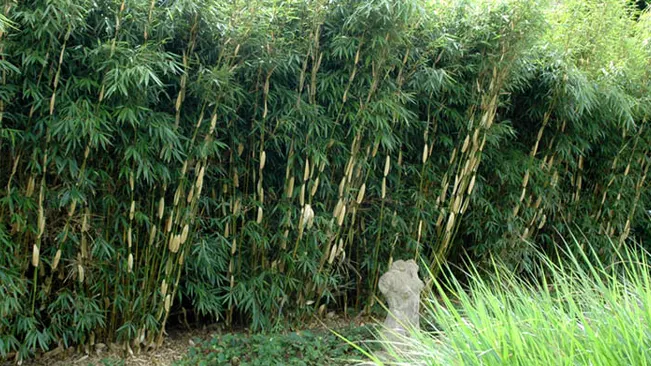
Bamboo, while technically a grass, is one of the fastest-growing plants in the world. Clumping bamboo species like Fargesia can grow up to 2 feet per year, creating a tall, dense privacy screen. It’s perfect for smaller yards and is non-invasive compared to running bamboo varieties.
4. Hybrid Poplar
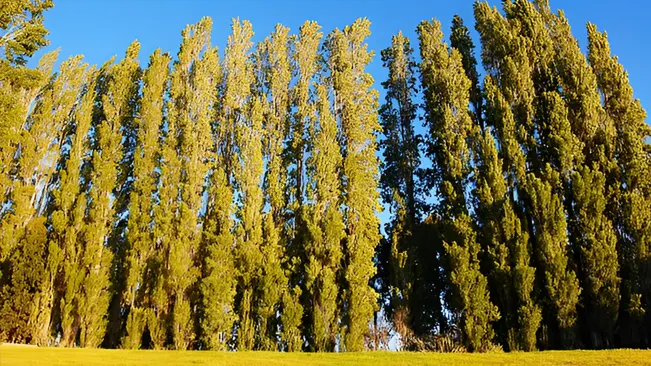
Hybrid Poplars are deciduous trees that grow exceptionally fast up to 5-8 feet annually. Although they lose their leaves in winter, they provide excellent coverage during warmer months. They are often used for windbreaks or creating large-scale natural privacy screens.
5. Eastern Redcedar
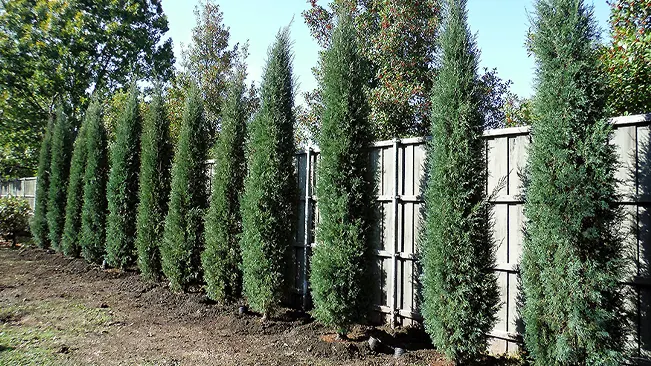
This hardy evergreen is native to the eastern United States and grows at a rate of about 1-2 feet per year. Its dense, columnar shape makes it ideal for tight spaces where a tall privacy screen is needed. It can tolerate a variety of soil types and is resistant to drought once established.
Practical Tips for Planting and Maintaining Fast Growing Privacy Trees
To get the best results from your privacy trees, consider these practical tips:
- Prepare the Soil: Before planting, amend the soil with organic matter like compost to improve its structure and nutrient content. This will encourage faster, healthier growth.
- Plant During the Right Season: The best time to plant trees is in the fall or early spring, when temperatures are mild. This gives the trees time to establish roots before facing extreme weather.
- Mulch and Water Consistently: Adding a layer of mulch around the base of your trees will help retain moisture and keep weeds at bay. Water your trees regularly, especially during dry periods.
- Prune Wisely: Regular pruning helps maintain the shape and density of your privacy trees, promoting fuller growth. Be careful not to over-prune, as this can slow down growth.
- Fertilize Appropriately: Use a balanced, slow-release fertilizer designed for trees to provide them with the nutrients they need for healthy development.
Conclusion
Fast growing privacy trees are an excellent solution for anyone looking to enhance their yard’s privacy without waiting decades. By selecting species suited to your climate, soil, and sunlight conditions, and following proper planting and maintenance practices, you can create a natural barrier that will grow quickly and thrive for years.
Frequently Asked Questions (FAQ)
- What are the fastest-growing trees for privacy?
Some of the fastest-growing trees for privacy include Leyland Cypress, Thuja Green Giant, Hybrid Poplar, Bamboo (Clumping varieties), and Eastern Redcedar. These species can grow several feet per year under optimal conditions, providing quick and effective privacy. - How long does it take for privacy trees to grow fully?
Fast growing privacy trees can take anywhere from 3 to 10 years to reach full maturity, depending on the species. For example, Hybrid Poplars can grow up to 5-8 feet per year, meaning they can offer full coverage in as little as 3-5 years. - Do fast growing privacy trees require a lot of maintenance?
While many fast growing trees require regular watering and proper care during the first few years, most of them are low-maintenance once established. Occasional pruning, mulching, and fertilization can help maintain their health and speed of growth. - Can privacy trees block noise as well as views?
Yes, many fast-growing privacy trees, especially dense evergreens like Leyland Cypress and Thuja Green Giant, can help reduce noise by creating a natural sound barrier. The thicker the foliage, the more effective the noise reduction. - Are there privacy trees that grow well in small spaces?
Yes, if you have a smaller yard or limited space, clumping bamboo or narrow, columnar trees like Eastern Redcedar are great options. These trees grow vertically, providing privacy without spreading too wide. - What is the best time of year to plant privacy trees?
The best time to plant privacy trees is during the fall or early spring when temperatures are cooler, but the ground is still workable. This gives the trees time to establish their roots before the hot summer months or cold winter conditions. - Can I mix different types of trees for my privacy screen?
Yes, mixing different species can add variety and increase biodiversity in your yard. Just ensure that the trees have similar growth requirements (sun, soil, water) so they thrive together. Combining deciduous and evergreen species can provide year-round privacy and visual interest.

David Murray
Forestry AuthorI'm David Murry, a forestry equipment specialist with a focus on chainsaw operation. With over 13 years of experience, I've honed my skills in operating and maintaining a wide range of machinery, from chainsaws to log splitters. My passion for the outdoors and commitment to sustainable forestry drive my work, which emphasizes safety, efficiency, and staying updated with industry advancements. Additionally, I'm dedicated to sharing my expertise and promoting environmental awareness within the forestry community.













Leave your comment